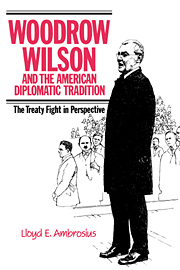Book contents
- Frontmatter
- Contents
- Preface
- Acknowledgments
- List of abbreviations
- 1 Introduction: Wilson's new world
- 2 Origins of Wilson's league of nations idea
- 3 Drafting of the League of Nations Covenant
- 4 American criticism of Wilson's peacemaking
- 5 Revision of the League of Nations Covenant
- 6 The question of control at home and abroad
- 7 The Versailles Treaty in the Senate
- 8 American rejection of the Versailles peace
- 9 The aftermath of Wilson's peacemaking
- 10 Epilogue: Wilson's legacy
- Bibliography
- Index
- Frontmatter
- Contents
- Preface
- Acknowledgments
- List of abbreviations
- 1 Introduction: Wilson's new world
- 2 Origins of Wilson's league of nations idea
- 3 Drafting of the League of Nations Covenant
- 4 American criticism of Wilson's peacemaking
- 5 Revision of the League of Nations Covenant
- 6 The question of control at home and abroad
- 7 The Versailles Treaty in the Senate
- 8 American rejection of the Versailles peace
- 9 The aftermath of Wilson's peacemaking
- 10 Epilogue: Wilson's legacy
- Bibliography
- Index
Summary
World War I demonstrated the interdependence and pluralism of nations in the twentieth century. A global economy had developed, along with world-wide empires. Yet competing nations, and groups within them, continued to pursue their own separate interests. Paradoxically, both centralization and diversity characterized the modern world, which witnessed the simultaneous flourishing of internationalism and nationalism.
Most Americans, including President Woodrow Wilson, possessed only a limited understanding of this world. In 1914 they did not anticipate that the European war would engulf the United States. Wanting to remain isolated from the Old World, they adhered to the traditional American policy of neutrality. Imperial Germany's submarines, however, provoked the United States in 1917 to intervene on the Allies' side. The world was more interdependent than Americans had recognized. The Democratic president subsequently defined his war aims in the Fourteen Points. Placing the League of Nations at the center of his program, he hoped this postwar international organization would preserve peace. Yet the unity he sought failed to materialize at the Paris Peace Conference of 1919. Although the Allies as well as Germany had nominally approved most of his Fourteen Points, they opposed his definition of their national interests. In the United States as well, Wilson's foreign policy encountered resistance. Republicans, led by Senator Henry Cabot Lodge of Massachusetts, rejected the Versailles Treaty. They denounced the Covenant of the new League. Diversity among nations and within the United States continued to shape postwar politics.
- Type
- Chapter
- Information
- Woodrow Wilson and the American Diplomatic TraditionThe Treaty Fight in Perspective, pp. ix - xivPublisher: Cambridge University PressPrint publication year: 1987



